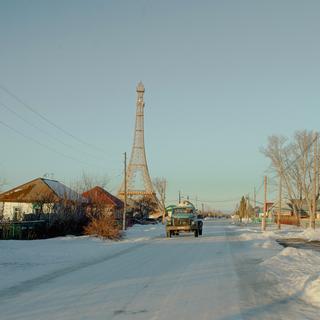


In the Russian village of Paris, the war in Ukraine is just background noise
FeatureThe village of Paris and its 1,700 inhabitants are paying a heavy price in the conflict with Ukraine. And yet, two years on, the attitude to the war is one of ambivalence.
In the village of Paris, south of the Urals, war takes up most of the space in the Vasily Blyukher school's small museum. The two rooms nestled on the third floor are filled with the tragedies of Russian history, leaving only a modest corner for the folk costumes and handicrafts of the region.
First, there was the Civil War (1917-1921), in which Red Marshal Blyukher was a leading figure before being assassinated by his own people in 1938. Then, the Great Patriotic War of 1941-1945, during which the village and its school paid an immense price: 500 men, almost the entire adult male population, fought in the war, and half did not return. In later years, 12 former students have enlisted in Afghanistan and five in Chechnya, their crumpled portraits proudly displayed.
In the school there remains a strong Soviet atmosphere. The children recite statistics concerning quantities of grain and livestock delivered by local peasants to the Red Army in 1941, like an epic poem. Some were dressed in Soviet pioneer uniforms, with white shirts and red ties. "Always ready," they chanted, pride in their voices.
A month ago a new display was installed, but the school's headmistress, Nadejda Ivanova, beckoned the pupils to hurry along, as if this one shouldn't be seen by foreigners. Artificial flowers, Z signs symbolizing the "special operation" in Ukraine, and new portraits whose paper has not yet had time to yellow – of the school's 10 former students currently deployed in Ukraine.
Ivanova would rather talk about the equipment her school has received – the building is old-fashioned, but each room has its own overhead projector and fresh paint on the walls. Or her pupils' good manners. They were indeed extremely polite: in the school corridors and on the street, children greet adults respectfully. "I can't even remember the last time I had to deal with a thief," said the headmistress, before showing us the best-equipped classrooms. They included the room where boys – only boys – could take technology and welding classes, and the one where girls – and only girls – could learn how to do household chores using brand new sewing machines and kitchen utensils.
'Parisians to Parisians'
Paris, 1,800 kilometers from Moscow, is the Russia of wooden huts called isbas and the glubinka – the deep countryside. The village has 1,700 inhabitants, the vast majority of whom are Nagaybaks, a Turkic-speaking ethnic group, close to the Tatars but of Orthodox faith. They are descendants of the Cossacks from the southern Urals, who rode across Europe on Napoleon's heels after his defeat in 1814. Upon returning home, the Nagaybak Cossacks were deployed by the Tsar to the southern reaches of the empire, on the borders of present-day Kazakhstan. They named their villages after the European cities they had been through, such as Leipzig, Berlin, Varna and Paris (Parij, in Russian), where troops had occupied the Champ de Mars and the Champs-Elysées.
You have 85% of this article left to read. The rest is for subscribers only.
